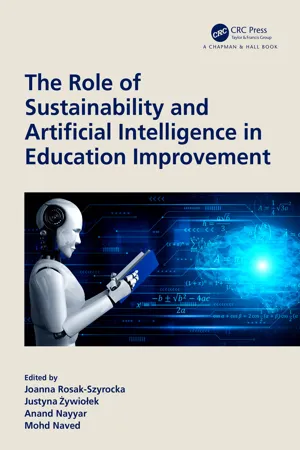
The Role of Sustainability and Artificial Intelligence in Education Improvement
- 246 pages
- English
- ePUB (mobile friendly)
- Available on iOS & Android
The Role of Sustainability and Artificial Intelligence in Education Improvement
About this book
This book is devoted to the issues faced by universities in the field of distance learning during and after COVID, as well as in digitalization times. The book devotes a lot of space to the issues of Web 3.0 in university e-learning, Industry 4.0, artificial intelligence and digital equity.
The aim and scope of this book is to draw a holistic picture of education before and after COVID, the psychological effects of COVID in education, and using modern technologies application in education, taking into consideration aspects of sustainability development, Industry 4.0 and Society 5.0. The authors also raise the issue of artificial intelligence investigation in learner-instructor interaction.
Features:
- To elaborate the functions of online education and numerous pedagogical strategies based on electronic learning to aid teachers and students with the tools required to succeed in the 21st century via engaging virtual experiences
- To analyze tools provided by Ed-Tech firms and the effect of digital tools on maintaining the educational process in times of crisis and after pandemic
- To create a roadmap for higher education institutions and provide tips regarding how to improve the effectiveness of the hybrid learning system
- To understand e-learning characteristic in the era of Industry 4.0 and Society 5.0 and characteristics of the different web generations
- To use AI applications to improve connections and relationships between students and teachers and in education in the future
The book is both scientific and educational. It can be used at the university level and by anyone interested in the topics it covers.
Frequently asked questions
- Essential is ideal for learners and professionals who enjoy exploring a wide range of subjects. Access the Essential Library with 800,000+ trusted titles and best-sellers across business, personal growth, and the humanities. Includes unlimited reading time and Standard Read Aloud voice.
- Complete: Perfect for advanced learners and researchers needing full, unrestricted access. Unlock 1.4M+ books across hundreds of subjects, including academic and specialized titles. The Complete Plan also includes advanced features like Premium Read Aloud and Research Assistant.
Please note we cannot support devices running on iOS 13 and Android 7 or earlier. Learn more about using the app.
Information
Table of contents
- Cover
- Half Title
- Title
- Copyright
- Contents
- About the Editors
- List of Contributors
- Preface
- Chapter 1 Hybrid Learning in Higher Education Institutions: Pathway, Implementation and Challenges
- Chapter 2 The Psychological Effects of COVID-19 on College Students due to the Digital Divide via Online Education
- Chapter 3 Investigation of Students’ Intention and Related Determinants for E-Learning Continuance in Education after COVID-19
- Chapter 4 Education 4.0 and Web 3.0 Technologies Application for Enhancement of Distance Learning Management Systems in the Post–COVID-19 Era
- Chapter 5 Undergraduate Perception towards E-Learning during the Pandemic: Evidence from State Universities in Sri Lanka
- Chapter 6 Online Teaching Sustainability and Strategies during the COVID-19 Epidemic
- Chapter 7 Inclusiveness and Sustainability of Teaching and Learning Technologies amidst the COVID-19 Pandemic in Higher Education: An Indian Perspective
- Chapter 8 Framework to Integrate Education 4.0 to Enhance the E-Learning Model for Industry 4.0 and Society 5.0
- Chapter 9 Towards Digital Equity: Reimagining Digital Learning through the Lens of Bloom’s Taxonomy
- Chapter 10 The Empirical Investigation of Artificial Intelligence for Enhancing the Learner–Instructor Interaction towards Online Learning Using Multiple Regression Analysis
- Chapter 11 Effect of Digital Competence and Pedagogies on Gender Orientation of Pedagogues: A Quantitative Study with Regression Modeling of Higher Education Institutions
- Chapter 12 Artificial Intelligence in Sustainable Education: Benefits, Applications, Framework, and Potential Barriers
- Index